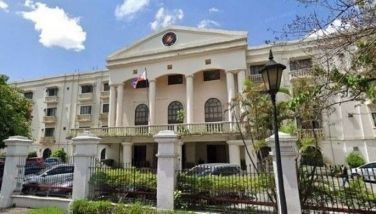Palace assures public SC appointments based on integrity
MANILA, Philippines – Malacañang assured the public yesterday that when the President makes an appointment, it is made with the interest of the public in mind.
Responding to the call of civil society groups for increased citizen’s participation and closer scrutiny of the appointments to the Supreme Court, two officials of the Palace emphasized that there are processes that have to be followed under the Constitution and that no one can question the power of the President to appoint.
Deputy presidential spokesperson Lorelei Fajardo pointed out that the Judicial and Bar Council is mandated by the Constitution to screen the nominees to the High Court and submit the final list of candidates to the President.
“The JBC is constitutionally mandated to review and screen applicants for positions in the judiciary. The President as the appointing authority has always been meticulous and prudent and makes decisions based on competence and integrity,” Fajardo said.
“She appoints only the finest judiciary minds of outstanding character because that is what the people deserve,” she added.
Fajardo said that the call of the civil society groups, while unnecessary, should be directed to the JBC.
The Transparency and Accountability Network, Alternative Law Groups, Philippine Association of Law Groups and the online news organization Newsbreak announced the establishment of the Supreme Court Appointments Watch the other day in light of the fact that seven justices will be retiring next year.
Fr. Joaquin Bernas said that in 2009, when the President appoints the replacements of the seven retiring justices, 14 of the 15 members of the Supreme Court would effectively be appointees of Mrs. Arroyo.
He emphasized that the selection of the next seven justices must be carefully scrutinized in order to ensure the independence of the Supreme Court.
Press Secretary Jesus Dureza welcomed the interest and concern raised by Bernas and the civil society groups as something that would “augur well for good governance.”
However, he also pointed out that the JBC is already in place to handle the screening of the nominees and so the recommendations to be made by the civil society groups should be addressed to the constitutional body.
“Those volunteering now to help in the search should not appear as if they have the monopoly of good intentions and good judgment by unduly raising initial doubts about the process,” Dureza said.
He explained that the President goes through her own “deep process of selection” after receiving the nominees of the JBC.
“For ultimately it is the President, as the Constitution mandates, who makes the final decision based on her own assessment and judgment that the appointees will best serve the interest of the people,” Dureza said.
“After she performs her constitutional function, the appointees then belong to the institution that is totally independent from the presidency,” he said – Marvin Sy
- Latest
- Trending






























